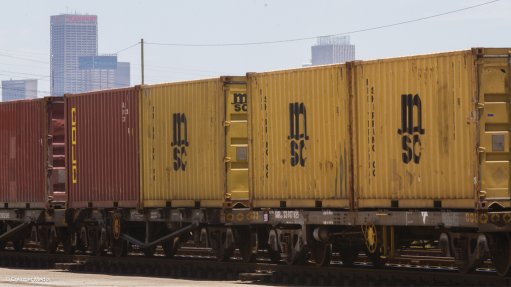
Photo by: Duane Daws
The South African government believes the launch of a new one-stop shop to facilitate higher levels of trade and investment in the rest of Africa will help consolidate the continent as the country’s most important market for value-added goods and create the platform for an expansion in exports beyond the R300-billion achieved in 2015.
The new initiative, named Trade Investment Africa (TIA), was formally launched in Pretoria on Friday by Trade and Industry Minister Dr Rob Davies, who noted that, despite low levels of intra-African trade – which stood at below 15% – the continent already accounted for 30% of South Africa’s trade and was also the “most important market for our value-added exports”.
He stressed, however, that the TIA had not been established to simply “flog” more South African products on African markets. Instead, it had been coupled with a campaign to support expanded investment by South African firms, which would carry the twin benefits of improving trade sustainability and enhancing the reputation of South African firms.
South Africa imported only R114-billion from African countries in 2015, down from the 2014 peak of R141-billion. The fall was largely attributed to the decline in commodities, notably oil, during the period and underlined, Davies argued, the need to approach the relationship with other African countries with an intention to support their diversification and industrialization ambitions. By contrast South African exports continued to rise from the low base of only R9.6-billion recorded at the dawn of democracy in 1994.
GOOD BUSINESS PRACTICE?
The launch of TIA also coincided with the formal release of ‘Guidelines of Good Business Practice by South African Companies’ operating on the continent. The guidelines deal with issues such as bribery, corruption and compliance with business, tax and environmental regulations in these countries.
It was voluntary for companies to become signatories to the guidelines, but Davies said it would provide government with greater comfort in endorsing those South African firms seeking to expand their presence in the rest of the continent.
Speaking at the launch on behalf of the Nepad Business Foundation, Greg Nott, of Norton Rose Fulbright, said the guidelines were in step with recent research, showing a direct correlation between governance frameworks and the performance of investments by companies operating in Africa. "Much of the success or failure of operating in Africa hinges on the softer issues that include government support, governance issues, as well as attitudes and behaviour of business as they expand into other territories."
But there was also a need, Nott added, for governments to step in and make the process of doing business much easier – lowering the cost of doing business by putting in place investment- and business-friendly policies to encourage growth.
TIA CEO Lerato Mataboge said the unit, which began operations in April and is currently housed at the DTI campus in Pretoria, was providing specialised assistance for businesses seeking to access export opportunities, or firms keen to invest in other African countries.
The services include access to capital, including government incentives and export insurance finance, as well as facilitating access to markets through supporting sector-specific trade mission or tackling nontariff barriers.
Mataboge reported that the unit would also be undertaking research to improve visibility of the opportunities in the various markets, with specific plans to tap government established network of foreign economic representatives spread across the continent.
Separately, DTI would continue with efforts to finalise the trilateral free trade area (T-FTA) involving regional communities in Southern and East Africa and create a 600-million-person-strong, $1-trillion market spanning from Cape Town to Cairo.
Davies acknowledged that the process had been slower than South Africa had initially hoped, but stressed that work was continuing and that the T-FTA would form the basis, eventually, for a continental FTA.